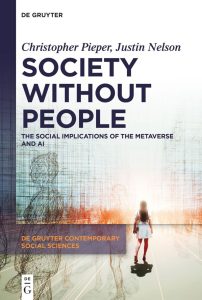 What happens when chatbots replace neighbors, and virtual worlds become more appealing than the real one?
What happens when chatbots replace neighbors, and virtual worlds become more appealing than the real one?
In their new book, Society Without People: The Social Implications of the Metaverse and AI, Campbell University Associate Professor of Sociology Dr. Justin Nelson and Baylor University Senior Lecturer of Sociology Dr. Christopher Pieper ask the questions needed for this pivotal time in history:
How do we preserve human dignity in a world increasingly mediated by machines?
Published by De Gruyter, Society Without People offers a sweeping and accessible analysis of how emerging technologies — especially generative AI and immersive virtual worlds — are reshaping identity, community and the very meaning of human connection. In their book, Nelson and Piper argue that these tools are not just technological novelties, but powerful forces re-architecting our social fabric.
“All tech problems are eventually solved,” Pieper and Nelson write. “Human problems take much, much longer.”
From virtual identity formation and algorithmic governance to the ethics of digital personhood, the book explores how society is evolving under the influence of platforms, avatars, and artificial agents. It introduces the provocative theory of Gamism — the idea that game logic may become the dominant ideology of our digital future.
“This isn’t a dystopian warning,” detailed Nelson, Associate Professor of Sociology at Campbell University, “It’s a call to understand how our lives are changing and to engage with those changes thoughtfully and ethically.”
“This book is about asking the deeper questions — what kind of society are we building, and who gets to participate?” says Pieper.
Another feature that sets the book apart is the sketching of three plausible future scenarios for each aspect of society the authors examined. These scenarios are identified as Utopian (best possible outcome), Dystopian (worst possible), and Balanced (a mix of positive and negative effects). Nelson and Pieper stressed that while many books on the future include projections, they usually arrive at a single vision, which is typically exaggerated and inaccurate.
“We are trying to think in terms of ranges of probability rather than precise events or timelines,” added Nelson. “The goal is not to be right or wrong in terms of predictions, but to thoroughly describe the whole scope of social effects that could arise if a given scenario is realized. We feel this is a much more valuable social contribution than winning the prophet award.”
____________
